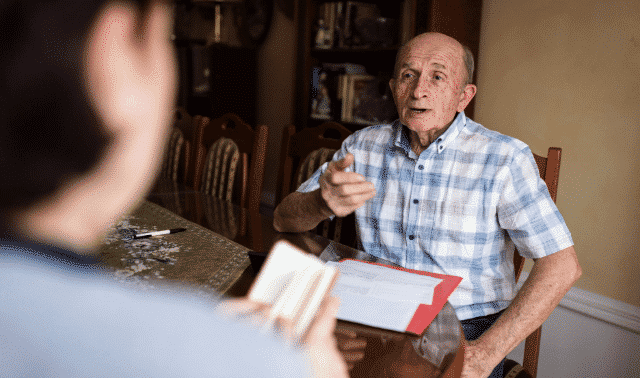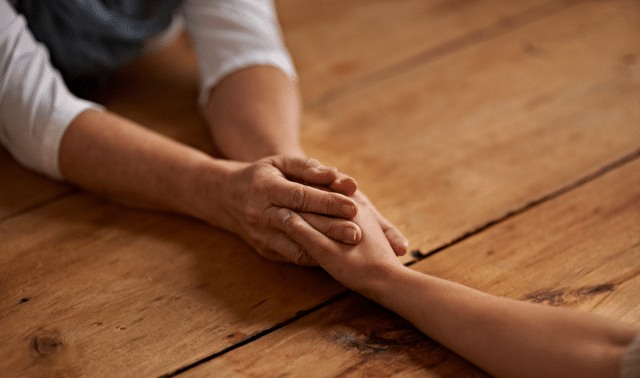
Many genealogists have had the rewarding experience of interviewing older relatives about their lives. We do this to capture their stories and connect with them while we still can.
But too often, we question only our oldest relatives or those who are failing in health. We neglect siblings, spouses, children and even our parents. As family history sources, they can seem too close to us. After all, don’t we all know the same stories and people? And if they remember things differently than we do, do we really want to hear their versions of the past?
The truth is, in a marriage, each spouse will recall different details from the courtship. Every child will remember his or her mother in a unique way. Our parents’ perspectives on our childhoods are astoundingly different from our own. And of course, there’s a part of every family member’s life that we didn’t experience, whether it was a father’s youth or a sister’s college years.
You may have a sense of your family’s history based on your own experiences and what your oldest and most talkative relatives have told you. But younger relatives, collateral kin (that is, any blood relatives who aren’t your ancestors) and a host of folks who aren’t even family can paint a truer—fuller—picture.
So whom should you add to your interview list? Here, experts and everyday genealogists share the unlikely sources who helped them create comprehensive family histories.
1. Close Family: Aunts, Uncles, Siblings and Parents
| Questions to ask your family How do you remember this event? Describe your relationship with ___. What are your favorite memories of that time? Tell me about before I was born/after I left home. What aspects of life were hard for you? Who else might tell me more about ___’s life? |
With so many family members to interview, where do you start? Ruth Lang, a professional genealogist in Fresno, Calif., suggests targeting mid-life relatives. “Middle age is a good time to talk to people,” she says. “They start thinking about family a little more; maybe they have older relatives living with them. I have often talked with younger relatives who have lots of family history information. At 40, I myself probably know more about my family than most of my relatives!”
Lang says you also might consider which relative knows the most about your current area of research. “Let’s say you’re writing about your own life story. You may want to talk with your siblings, who can fill you in on the neighborhood and people you may not recall.”
Don’t forget your kid sister, says Lang; she may know things that will surprise you. “Siblings of any age, if you sit down and talk with them, they can fill you in,” she says. “They have different perspectives. My younger brother and sister lived a really different life than my older ones did. It was a different, busier time by the time they came along.”
Conversations with my own parents have captured some of my most cherished family memories. During one telephone interview, my parents reviewed a CD full of scanned photos from my childhood. On the other end of the line, I typed their comments and asked follow-up questions. They shared stories I’d heard many times but had never written down, and plenty of new details. Often they laughed and teased each other about the past.
That interview captured more than memories. My parents’ banter provided insight into their relationship. My follow-up questions about how they managed six children prompted lessons in parenting for me, a young mom at the time.
But not every family interview is so easy and fun. I haven’t braved interviews with my brothers yet; I’m not sure I want to hear what they thought of their bossy only sister. Plenty of people have similar sensitivities about delving into their immediate pasts.
There may be family members you’re not emotionally ready to interview yet, or questions you’re not ready to ask. Consider conducting interviews on less-sensitive topics or requesting that someone else—a family friend, local history buff or professional genealogist—conduct the interviews for you.
2. In-Laws
| Questions to ask your in-laws What do you love or admire about this family? What drives you crazy about this family? Whom are you closest to or most like in this family? Tell me about a time you felt included/left out. How is this family like or different from your own? What family stories do you know that may not be public? |
A few years ago, I researched the life of a recently deceased older woman. I was trying to figure out how she met her husband. They were from different states, and neither attended college or had the means to travel much.
I mentioned my puzzlement to the deceased woman’s daughter-in-law. She laughed. “I don’t know why they were in the same place, but I’m pretty sure they met in a bar,” she said. “She was quite a party girl.”
I turned to the daughter-in-law with new interest. She was a source I’d never considered interviewing. That experience taught me that those who marry into a family have an up-close perspective, for better or worse. With an outsider’s insight, they pick up on family idiosyncrasies and the things that aren’t talked about. And they’re often more than willing to share.
By the same token, if you’re married, you are an in-law. Your spouse’s family can give you a fresh, interesting research subject while you pay homage to your in-laws and record your children’s heritage (if you have children or stepchildren by this spouse).
In-laws can be a great source of documents and family paraphernalia, as well. While researching the life of a childless woman who died in the 1970s, I found her family’s heirlooms—marriage certificates, photo albums, even the family silver—in her husband’s possession. Not knowing what to do with them since his wife had been an only child and her parents were long deceased, he’d held onto them after her death.
Occasionally, you have to follow in-law relationships through multiple marriages to find your family’s treasures. My friend Nancy Gould was given an old Gould family Bible by her stepgrandfather’s second wife (her grandmother was the first wife). The second wife also had a birth certificate for a mystery son, Gordon, from the first marriage. The child turned out to be Gould’s not-at-all-mysterious uncle Bill, who was renamed on his fifth day of life. But the mystery became a funny family story.
3. Distant Relatives: Second Cousins, First Cousins Once Removed, etc.
| Questions to ask distant relatives What can you tell me about the oldest relative (on this line) you remember? Can you describe general family traits (physical or personality) of this line? What holiday, religious or ethnic traditions come from this family? Do you have old family photos, documents or Bibles you’d copy for me? Whom else should I interview? |
Once you’ve questioned your immediate family, it’s time to broaden your investigation to second cousins, great-aunts and that random relative whose relationship to you defies easy definition.
Why would you talk to far-flung kin? Think of your great-great-grandparents as a fountainhead of family lore. It’s easy to imagine the many channels through which their history trickles down: from your great-granduncle to his daughter to her son, your second cousin once removed. That cousin may have a small but priceless pool of knowledge about your common past.
For example, my father, Richard McClellan, has built a loose network of distant cousins, all descendants of Samuel and Johanna McGahey, my third-great-grandparents. It started when he answered an online query regarding McGahey’s son, uncle to my family. Another posting captured the third branch of McGahey’s family. Each cousin knew pieces of the family story. Two of them had photographs of Johanna. Two of them corroborated evidence of her burial place. One found Samuel’s Civil War unit, and another requested the pension papers.
How can you find distant relatives with whom to collaborate? My dad used a popular method: Find their postings on genealogy websites. RootsWeb is a free and favorite heritage hangout. You can upload and search family trees, sign up for surname-specific mailing lists or post questions to the message boards—all 161,000 of them, with 17 million-plus searchable postings.
Finding relatives this way can be a shot in the dark, however. Your post may not be seen by the right people, or you may excitedly respond to a message only to find that the person’s contact information has changed. Post the same information on multiple sites, and be patient. Don’t forget to take advantage of memberships to sites such as Ancestry.com that allow you to connect with other members.
You also can do a little reverse genealogy, or track all descendants of a common ancestor forward. Start with a reverse family tree, like the five-generation descendant chart available through Misbach Enterprises. Trace collateral lines forward. When you bump into privacy-restricted data, use the most recently known information (hometown, details found in an obituary) to track down living descendants to interview.
Finally, don’t forget to ask older relatives what they know about your collateral lines. They may recall where Great-uncle Paul settled after the war. Perhaps they can tell you who organized that long-ago family reunion. They might even possess a family Bible. Any hints may help.
4. Friends and Acquaintances
| Questions to ask friends and acquaintances Describe the (neighborhood, group, unit) to which you and ___ belonged. What was the ___ family like? Can you recall anything in particular for which ___ was known? Describe your relationship with ___. Who else might know something about ___? |
Sometimes the best genealogy clues don’t come from family members but rather from others who knew them. James South, a professional genealogist in Hanceville, Ala., finds that local memories stretch back far.
“Especially in the Deep South, you can go into a small town and find a store owner or bank owner who can tell you about the family as they knew them,” he says. “You may find out about extra brothers and sisters, because a lot of children here in the South were missed in the 1900 and 1910 census. You can find out about their quality of life—maybe they were sharecroppers but had a nice home and good education.”
South once interviewed the administrators and staff at an assisted-living home where a client’s grandmother had resided. “She had died several years ago. I had a letter of reference from the family who asked for the research, stating who I am and giving me permission to find out about that family. The home gave me a list of those who had come to visit her. We discovered [the client] had several great-uncles and -aunts the client had never known about. All lived within about a 15-mile radius.”
South doesn’t request confidential information on recently deceased people. But with proof of identity (or a letter of reference from the client), he usually finds that people are generous with their memories.
Who specifically might you interview from the old hometown? Anyone who may have known your family: friends, neighbors, co-workers, church members, civic club chums, military buddies. Veterans who fraternized at the same American Legion or VFW post can be great interview sources. Years ago, my friends Tom and Paula Shepherd learned this while hunting for Shepherd relatives in a small Kansas town. After noticing that the local veterans organization bore the Shepherd name, they stopped and asked to meet any old-time vet who might tell them more. They met a man who helped them identify this Shepherd as part of a collateral line that had died out.
Your relatives’ old friends may hesitate to give you the whole story about your family, especially if they don’t know you. By being open and friendly with them, you can encourage them to speak their minds. Make sure your questions and responses show that you are nonjudgmental and interested in everything they have to say. During your interview, you might refer to your family members by their first names (instead of “my grandma”); this will give you an air of objectivity.
5. Local Historians
| Questions to ask a hometown expert What, if anything, do you know about the ___ family? Can you tell me about (migration, industry, religion) here during this time period? What book(s) should I read to learn more about your town? What other resources do you have locally that may help me find my ancestors? Who might offer research help? Can you think of anyone else who might be able to help me? |
Years ago, after moving to a small northeast Ohio town, my father discovered he had an ancestor who’d lived there 150 years earlier. At the library, he found three binders full of local history compiled by longtime resident Sylvia Wiggins. The binders contained references to his ancestor, but not a burial place. Fortunately, Wiggins had noted her telephone number on the binders.
“I called her, and she told us where he was buried,” he recalls. “It was a tiny, abandoned family cemetery on a back road, with about 15 headstones in it. I never would have found it on my own.”
This experience taught him the value of interviewing town historians and other hometown experts when he’s trying to get to know an ancestral community. “They often spend their whole lives there, and they know everything,” he says. “They can tell you about settlement and migration patterns, local occupations and religious groups. They know about write-ups on the early churches or cemetery transcriptions that will never see the light of day beyond their little town.”
Town historians and local genealogy buffs may not recognize your ancestor’s name. But if you tell them a year of arrival, they may be able to tell you what Connecticut town he probably came from or which route he likely took to reach town or the name of the local regiment with which he would have enlisted during the Civil War.
Whom hometown experts know can be just as valuable as what they know. Tim Richards of Olmsted Township, Ohio, once contacted a county genealogical society in Ottawa, Canada. He was immediately redirected to a neighboring genealogical society and to his third cousin, who was researching the same surname. Your local authority may help you connect with other folks you’re trying to find: the veterans’ group or the lady who wrote that history of the Methodist congregation.
Gould once reached interview subjects through her old hometown’s historical society. In the quarterly newsletter, she placed a notice asking for stories about her parents, who were raised there. She received two responses. One was from an elderly gentleman who used to walk past her grandmother’s house each day. Her “nana,” a young widow at the time, had flirted openly with this now-elderly gentleman. Years later, he still recalled her clearly.
You can find local historical and genealogical societies in the 2010 Directory of Genealogical and Historical Societies, Libraries and Periodicals in the US and Canada (Iron Gate Publishing), which may be available in the reference department at your library. Though online directories are far from exhaustive, you can try sites such as USGenNet and USGenWeb. You also might call directory assistance and ask for the “[County or Town] Historical Society,” or try an internet search for the town or county name along with the phrase “genealogical society” or “historical society.”
It may take a few interviews before you develop a clear picture of your ancestors and the lives they led. But talk to as many people as you can, and eventually you’ll have the facts and anecdotes you need to craft a comprehensive and compelling family history.
Related Reads
A version of this article appeared in the December 2010 issue of Family Tree Magazine.






